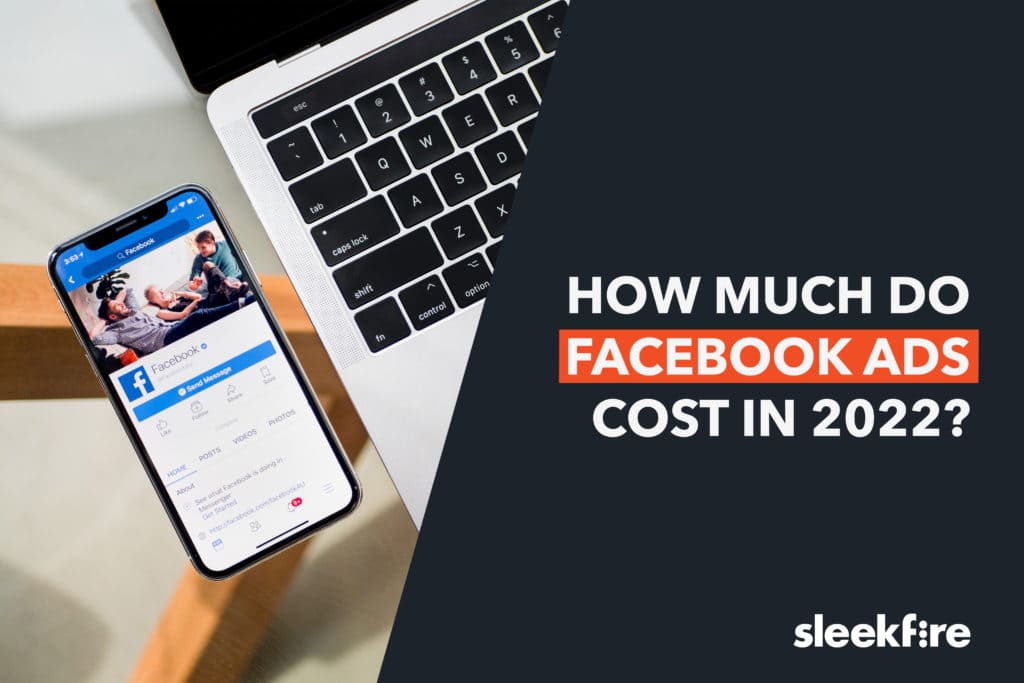
While we primarily focus on video production, we recognize many of our customers are in need of help distributing their content after we deliver it to them. Facebook is a great choice for someone who wants to promote their video but we often get the question “How much does it cost?”
This in-depth guide is going to answer that popular question. So let’s dive in.
Advertising on Facebook has become one of the most trusted ways to market a brand in 2022. In fact, Facebook stated that 10 million active advertisers were using the social networking platform to promote their products and services in the 3Q of 2020. I know what you’re thinking, that is a lot of competition!
Don’t let those numbers scare you off. Just because there are so many active advertisers on the platform does not mean you need a giant budget to start seeing results. Actually, it’s quite the opposite.
How Much Do Facebook Ads Cost?
The truth is… it depends.
Facebook says it best themselves:
Can you actually run ads on Facebook with any budget? Yes, you can! You can run ads for as little as one dollar a day on the platform. However, the average business spends $200-$800 on Facebook ads per month. It really depends on the size of your business and what you are advertising. It might make more sense to spend less than $200 or more than $800.
Here is another way to look at it. The average CPC (Cost Per Click) on Facebook is around $0.97 and the average CPM (Cost Per 1000 Impressions) is roughly $12.07. So this means if your monthly ad spend budget was $1000 you can expect to have 1030 clicks on your ad and have 82,000+ impressions on your ad every month.
What Determines Your Facebook Ad Cost?
The primary factor that determines your ad cost is the Facebook ad auction. As you probably know, you won’t be the only business advertising to your target audience. This is why Facebook uses an auction system to compete for ad space/delivery.
An example would be if two brands are trying to reach millennial men on Instagram, they would compete in the auction together. Usually, the higher bid wins, but the price isn’t the only factor when deciding the winner of the auction.
Facebook’s algorithm looks at ad quality to determine how engaging it is for the target audience. They use estimated action rates and ad quality to determine the ad’s relevance. To keep it simple, it’s just an estimate of how likely the ad is to receive likes, comments, or shares.
In summary, Facebook generates an ad’s total value, based on the bid, estimated action rates, and ad quality. Then Facebook delivers the winning ad (with the highest total value) to the ad space.
What Other Factors Influence cost?
If you are managing your own Facebook Ad Campaign, then there are going to be 6 other factors that influence the cost of your campaign. Understanding these factors will help you win that auction we talked about earlier. If you aren’t managing your own campaign, you will also have management fees from whatever agency you partner with.
Factors that influence Facebook Ad Cost:
- Audience
- Ad Objective
- Ad Placement
- Ad Quality
- Season
- Industry
Audience:
With Facebook ads, you can target users based on their age, gender, occupation, location, and interests. The targeting selected for your campaign has a severe impact on the cost.
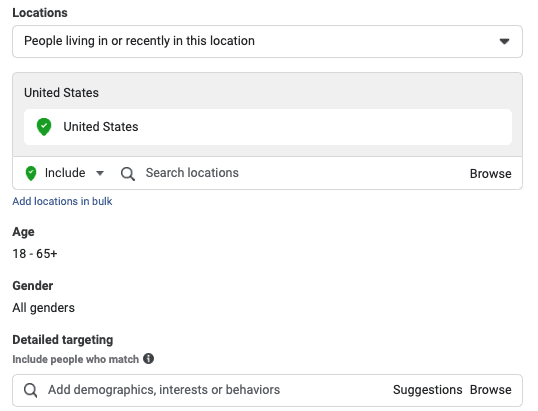
Focus on the people who are the best fit for your business. You don’t want to pay for clicks or views that offer zero value when it comes to your long-term goals, like driving a sale or generating a lead.
Ad Objective:
When you create a new ad campaign, you will be prompted to choose a campaign objective. The three options are:
- Awareness
- Traffic
- Consideration
Once you choose your objective, you will have to choose a specific goal.
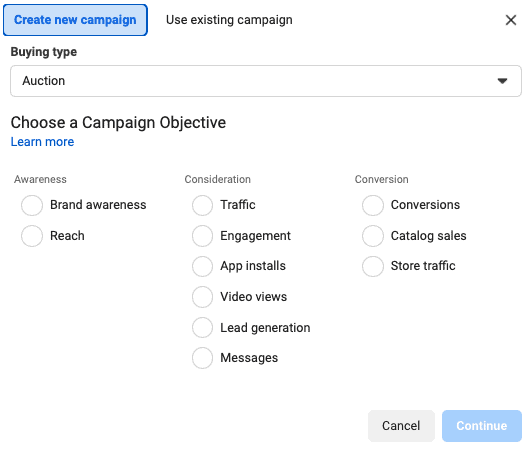
Awareness and consideration objectives tend to be cheaper than conversion goals. This is because conversion campaigns are at the end of the sales funnel, usually generating more revenue than the other objectives.
Ad Placement:
When you create a campaign on Facebook’s ad manager, you can choose to advertise on 4 platforms:
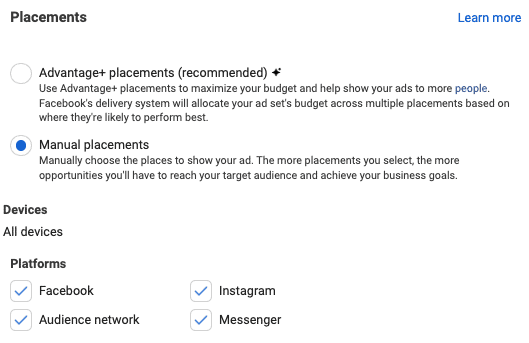
You can choose 21 different ad placements from those platforms.
- Facebook Feed
- Instagram feed
- Facebook Marketplace
- Facebook video feeds
- Facebook right column
- Instagram Explore
- Instagram Shop
- Messenger inbox
- Instagram Stories
- Facebook Stories
- Messenger Stories
- Instagram Reels
- Facebook Reels
- Facebook in-stream videos
- Facebook overlay ads in Reels
- Facebook search results
- Messenger sponsored messages
- Facebook Instant Articles
- Audience Network native, banner and interstitial
- Audience Network rewarded videos
- Audience Network in-stream videos
On average, Facebook’s CPC is about $0.30 cheaper than ads run on Instagram. The audience network has the lowest CPC out of all of the options, about $0.50 cheaper than Instagram.
The placement of your ads across Facebook properties does have an influence on your advertising costs. You have the option to automate this process or select specific placements you want your ads shown.
Ad Quality:
Facebook ranks the relevance and quality of your ad before and during a campaign. Ads with better quality usually have higher engagement rates and will ultimately be cheaper. Try your best to design ads that engage and deliver on user expectations.
Season:
The time of year can also affect the cost of your ads. If you advertise around some of the major shopping days (i.e. Black Friday, Christmas, Cyber Monday, etc… ) you should expect an increase in the CPC for your campaign. This is because businesses tend to increase ad spending during peak shopping seasons. The increase in competition can lead to aggressive ad bids and bigger campaign budgets.
Higher ad spend can sound like a turnoff but your business should take advantage of the increase in consumer spending as well.
Industry:
Your industry can also shape your Facebook advertising costs. Markets with the highest advertising costs include finance, insurance, and consumer services. If you’re in a competitive sector, focus on creating top-notch ads and setting competitive bids.
Conclusion
The truth is, Facebook ads aren’t necessarily the right move for every business. If you are debating whether it is worth it to invest in Facebook ads, make sure to evaluate your target audience and your goals. If you have a marketing objective that aligns with the platform’s strengths, it makes sense to advertise on the platform.

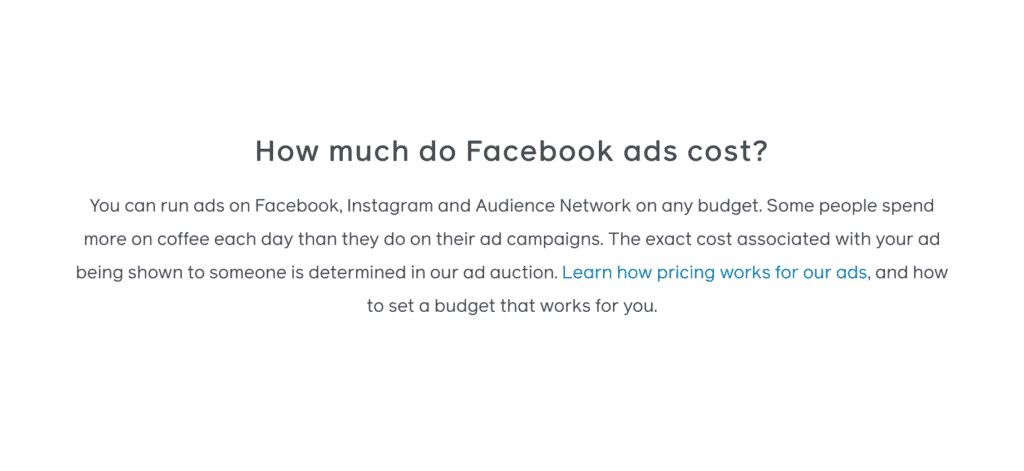
0 Comments